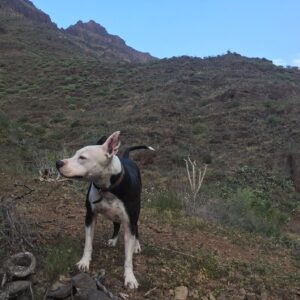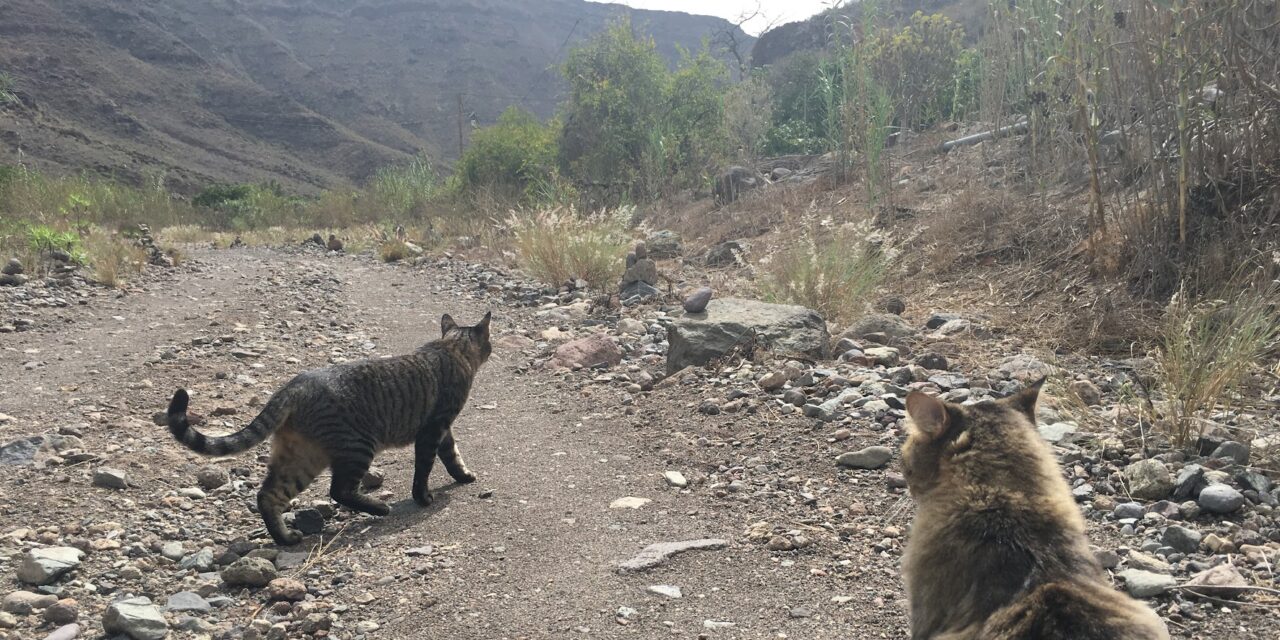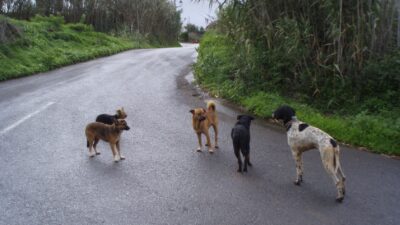In the Canary Islands, as throughout Spain, there are various hunting seasons every year. It has often been the case that if, while out in rural areas and away from houses, a licensed hunter happened upon any sort of animal living in the wild they were allowed to hunt them, so long as they are not on a list of endangered or protected species. Too often this has also included any dogs or cats that the hunter judged to be feral. Much of the culture around hunters has also been strongly criticised for inhumane treatment towards hunting dogs. Animal welfare groups, such as the national political formation PACMA, as well as many local groups like the Arguineguín-based TARA Animal Respect Association, for years have campaigned for the laws to change and provide special protection to “companion animals” as well as prevention of cruelty to any other animals.
Last Spring a new law was passed by the Spanish congress which, although it very much represents a triumph over many of the harms and cruelties that escaped definition under the old system, most animal activists say simply does not go far enough. One particular area of concern has been the exclusion of hunting dogs from the protections allowed to domestic pets, due to their being categorised as working animals. “The new law will leave out of its protection hunting, guard, work and sports dogs, production animals, bullfighting, experimentation and wild animals, among others.” say PACMA Nonetheless the new law marks a significant step forward, with new controls set to be established, licences allowed under the old system are still being continued until the Animal Welfare Law’s implementation.
Hunting Authorisations Overturned
The Government of the Canary Islands, this week, authorised the last licenses that allow the continued hunting of feral dogs, cats, and ferrets, until September 29th of this year, when the new Law for the Protection of Animal Rights and Welfare will finally come into effect.
 The order, that regulates the 2023 hunting season, published in the Official Gazette of the Canary Islands (BOC), specified that starting from that date, the hunting of dogs, cats, and ferrets would only be allowed “as a method of capture, to carry out control and eradication actions against invasive exotic species.” as under the new law they will be officially classified as companion animals, from that point on, and therefore prohibited for hunting, except in extreme or urgent circumstances. However the outgoing regional government were going to allow the practice to continue, until the (acting) President Ángel Víctor Torres reversed the decision at today’s last meeting of the Governing Council under his presidency.
The order, that regulates the 2023 hunting season, published in the Official Gazette of the Canary Islands (BOC), specified that starting from that date, the hunting of dogs, cats, and ferrets would only be allowed “as a method of capture, to carry out control and eradication actions against invasive exotic species.” as under the new law they will be officially classified as companion animals, from that point on, and therefore prohibited for hunting, except in extreme or urgent circumstances. However the outgoing regional government were going to allow the practice to continue, until the (acting) President Ángel Víctor Torres reversed the decision at today’s last meeting of the Governing Council under his presidency.
In a statement to the press Torres said that it would be a job for the newly elected incoming Regional Government to decide on implementation of the long awaited national law on animal rights and welfare, but he decided that he would not facilitate the hunting of these animals in the wild so close to the law coming into force.
From September 29th, hunting licenses may still be authorised for the control of species categorised as “of concern to the outermost region of the Canary Islands” on the basis that any such actions be specifically “aimed at safeguarding the safety of wildlife, in accordance with the exception contained in Article 27(a) of the aforementioned Law 7/2023″ for the Protection of Animal Rights and Welfare.” That means we may well see the continued hunting of feral goats should their numbers be uncontrolled.
Within that exception, the law still approves the sacrifice of companion animals “for reasons of safety for people or animals or the existence of duly justified risks to public health by the competent authority.”
“Therefore, until September 29th, 2023, for dogs, cats, and ferrets, or until a species is included in the positive list of companion animals, the hunting of feral animals is allowed in accordance with the provisions of the hunting seasons and through the use of the hunting methods and means provided for in this Order,” the Ministry of Ecological Transition detailed in the BOC, only to have that authorisation overturned as one of the last acts of the outgoing Regional President and his government, a government of note who have seen us through a global pandemic, volcanic eruptions, wild fires and more.
More than just hunting restrictions
 The New Law, passed in March 2023, establishes specific categories for cats, whether as pets, community animals, or strays, and the management of feline colonies.
The New Law, passed in March 2023, establishes specific categories for cats, whether as pets, community animals, or strays, and the management of feline colonies.
Spain’s Congress of Deputies, last March, approved the Law for the Protection of Animal Rights and Welfare, whose original proposal was presented by the Government of Pedro Sanchez (PSOE) in August of last year, and which affects the ownership and care of companion animals and captive wild animals, however with the exclusion of hunting, guard, and working dogs.
After going through the Spanish Senate —which introduced a dozen amendments— it was published in Spain’s Official State Gazette (BOE) and will subsequently enter into force this Autumn.
The new legislation, promoted by the Ministry of Social Rights as part of the Agenda 2030, aims to regulate “the recognition and protection of the dignity of animals” and establish legal mechanisms to “prevent a high degree of abandonment” in Spain, according to the statement of reasons in the project itself.
Training for pet owners
In practice, the implementation of the law will require animal owners to receive training for the dignified treatment of their pets, as well as registering and keeping them located at all times (which means they cannot abandon them or leave them without company or supervision in a house for extended periods).
The sale and exhibition of dogs, cats, and ferrets in pet shops are prohibited. All dogs and cats over six months old must be properly registered and chipped.
Furthermore, the law establishes which species of wildlife cannot be kept at home (this list includes, among others, venomous reptiles and those that exceed two kilograms in weight as adults, except for turtles). For each species, there will be specific regulations, but, in general terms, owners are considered responsible for any damage, harm, or nuisance caused by their animals to third parties, and in the case of loss or escape, it must be reported to the authorities.
Regarding trade, deriving economic benefit from the sale of dogs, cats, and ferrets, particularly in pet shops, and their exhibition and public display for commercial purposes, is prohibited. Only registered breeders will be allowed to charge a fee for dogs, cats, or ferrets and most other animals deemed as domestic pets.
Neither domestic animals nor strays should suffer
In the initial articles, the law states its purpose of achieving that “adequate level” of safeguarding, promoting responsible ownership and coexistence, combating mistreatment, promoting adoption and “responsible selling,” promoting campaigns for identification, prevention, and treatment of diseases, and establishing obligations for both public administrations and citizens regarding the care and rights of animals.
The law also defines the categories of animals covered by the law (what is meant by a domestic, wild, or abandoned animal), as well as a series of requirements that all animal shelters, breeding centres, and animal protection shelters must meet.
The concept of a “feline colony” has now been defined and codified under the law, and how they are to be managed, as is when a cat is considered either a “community” or “stray” animal, and when veterinary assistance is mandatory, and how to approach “assisted death,” among other concepts.
Animals cannot be used in shows, or in mechanical attractions, or fairground carousels that may cause them distress or pain.
Mistreatment is explicitly prohibited
Regarding specific measures against animal suffering, mistreatment and “negligent treatment” are expressly prohibited, as well as intentional abandonment in enclosed or open spaces, especially “in the natural environment, where they can cause subsequent damage due to feralisation or their status as potentially invasive exotic species.”
According to the new law, animals cannot be used in public shows or artistic, tourist, or advertising activities that cause them distress or pain. They also cannot be used in mechanical attractions or fairground carousels, given as rewards or prizes, or raffled. The promotion or use of animals belonging to species of wild fauna in circus shows is also not allowed.
Shooting live pigeons or tube shooting, subjecting animals to inappropriate work, and feeding them with offal, carcasses, and other remains from animals that have not passed the necessary controls are not permitted.
As for practices of mutilation (functional or aesthetic), these will be abolished, except for identification systems through ear marking for community cats and those required for therapeutic purposes or to limit or eliminate their reproductive capacity.
And of course, animals cannot be used for fights or trained for such purposes.
In addition, “the adoption mechanisms for abandoned individuals are defined, establishing educational, informative, and animal control criteria to ensure that unidentified animals are the exception to a norm where the majority of them are identified and have up-to-date veterinary treatments.”
Use of public transportation and other permissions
According to the provisions of the new Animal Welfare Law, public and private transportation services will facilitate the entry of companion animals that do not pose a risk. However, public taxi and private hire vehicle drivers may accept companion animals in their vehicles at their discretion. Short, medium, and long-distance railway operators will take necessary measures to facilitate the transportation of companion animals by train.
Railway operators will now take necessary measures to facilitate the transportation of companion animals on trains.
Public and private establishments, hotels, restaurants, and bars may allow the entry of companion animals, and if they do not, they must display a sign indicating so.
The proposed law regulates the participation of animals in fairs or cultural activities such as exhibitions. In this regard, it requires that animals be well-fed and hydrated, and have an “adequate space to take shelter from inclement weather conditions.”
During pilgrimages or fairs, animals must be in an “optimal hygienic-sanitary condition.” Furthermore, the use of animals in such events is prohibited “when excessive temperatures are identified” or “pyrotechnic elements are used.”
Among other measures, the law provides for the creation of a Central Registry System for Animal Protection, the development of an Animal Protection Statistics report to assess the state of animal welfare in Spanish society, as well as a National Animal Protection Plan that will set objectives and actions to “eradicate animal abuse in all its forms from our society.”
Dog owners will be required to complete a training course aimed at promoting responsible ownership of the animal.
Another aspect highlighted in the text is the requirement for dog owners to complete a training course aimed at promoting responsible ownership of the animal. Specifically, the law stipulates that individuals living with companion animals have a duty to protect them and must “complete the regulated responsible ownership training specific to each species of companion animal.”
During the final debate on the new law in the Congress, the approved amendments from the Senate were considered, and ultimately, 10 out of the 18 amendments introduced in the Upper House were included. The Plenary Session of the Congress of Deputies also approved the amendment to the Penal Code regarding animal abuse.
The new law comes into force on September 29th 2023











